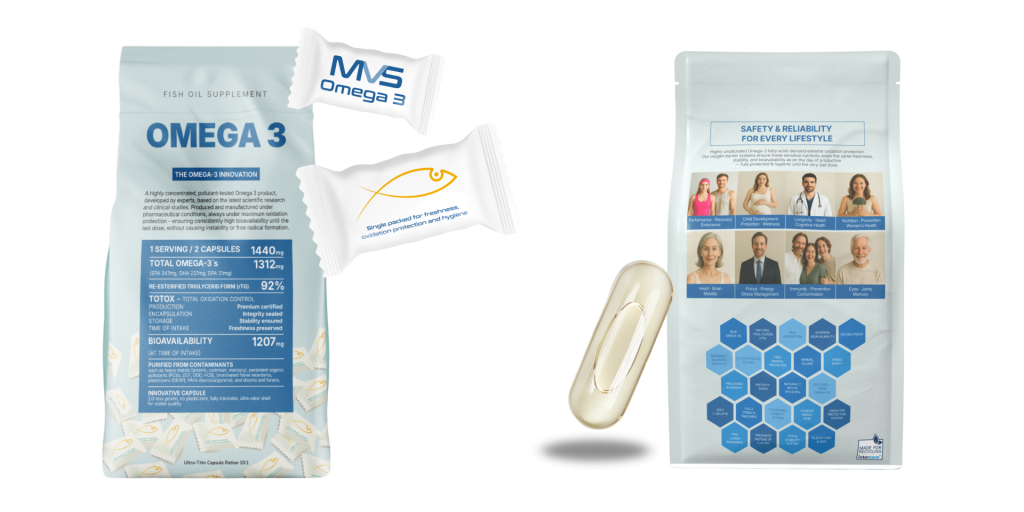Table of Contents
Introduction
Omega-3s are among the most researched and beneficial nutrients for human health. Yet, like any supplement, they are not without potential downsides. While generally safe, dosage, product quality, and individual health conditions can influence how people tolerate Omega-3s.
This guide provides an up-to-date overview of the 7 most common side effects of Omega-3 supplementation, what science says about them, and how to minimize risks while maximizing benefits.
- Gastrointestinal Discomfort
- Common effects: bloating, belching, nausea, diarrhea.
- Causes: poor-quality oils, oxidation, and taking supplements on an empty stomach.
- Solutions:
- Take with meals containing fat.
- Choose the rTG form for easier digestion.
- Look for individually sealed, fresh capsules (less rancidity = less burping).
- Blood Thinning & Bleeding Risk
- Omega-3s reduce platelet aggregation → beneficial for heart health.
- Risk: at very high doses (>3 g/day EPA+DHA), bleeding risk increases, especially for people on anticoagulants (warfarin, aspirin, clopidogrel).
- Latest 2025 evidence: For healthy adults, doses up to 3 g/day are safe, but clinical supervision is required above this.
- Interactions with Medications
- Interacts with:
- Anticoagulants & antiplatelets → enhanced blood-thinning.
- Blood pressure medications → additive effects.
- Chemotherapy & immunosuppressants → possible immune-modulating interactions.
- Advice: Always consult a doctor before combining high-dose Omega-3 with prescription meds.
- Interacts with:
- Allergic Reactions
- Fish allergy risk: People allergic to fish or shellfish may react to fish-derived oils.
- Symptoms: rash, swelling, shortness of breath (rare but serious).
- Solution: choose algae-based Omega-3 supplements, naturally allergen-free.
- Vitamin A & D Toxicity (Cod Liver Oil)
- Some fish liver oils contain high vitamin A/D.
- Risk: Overuse may lead to nausea, joint pain, fatigue, and liver strain.
- Solution: Avoid excessive cod liver oil; use purified fish oil or algae oil.
- Oxidation & Rancidity Risks
- Oxidized fish oil = rancid, with a fishy smell and degraded efficacy.
- May produce harmful byproducts that increase oxidative stress.
- Prevention:
- Choose low TOTOX-value supplements.
- Look for individually sealed capsules and rTG form – such as MVS Omega-3.
- Store away from heat/light.
- Immune System Effects
- Omega-3s modulate inflammation and immunity.
- Beneficial for autoimmune diseases, but in people on immunosuppressive drugs, caution is advised.
- Solution: Consult a healthcare provider if immunocompromised.
Are Omega-3s Safe Overall?
- Yes, when used within guidelines.
- EFSA, FDA, and WHO confirm that up to 3 g/day EPA+DHA is safe for the general population.
- The key is quality + the right dosage + individual health status.
Summary
Omega-3 side effects are generally mild and preventable. The main risks involve digestion, bleeding at high doses, medication interactions, allergies, vitamin toxicity, and rancidity. By choosing high-quality, properly packaged supplements in the right form and dose, consumers can enjoy the full benefits of Omega-3 with minimal risk.
MVS Omega-3 — Setting a New Standard in Purity, Stability, and Bioavailability
Developed by MVS Pharma’s medical and pharmaceutical experts, MVS Omega-3 represents a new generation of scientifically designed Omega-3 supplements. With a 92% natural rTG structure, verified bioavailability of 1207 mg, and our proprietary T-TOX™ oxidation control system, it ensures exceptional purity, stability, and absorption. Each batch meets European Pharmacopeia standards and is tested for over 20 potential contaminants — setting a benchmark for transparency and trust in modern nutritional science.

Not all Omega-3 supplements are created equal. The more unsaturated and effective Omega-3 molecules become, the more sensitive they are to air exposure — making oxidation protection the single most critical factor for preserving both safety and bioavailability. Once oxidation begins, oil turns rancid, loses efficacy, and may even generate free radicals.
At MVS Pharma, this challenge defined our mission. We engineered MVS Omega-3 as a next-generation formulation designed for uncompromised purity, verified stability, and maximum biological usability.
Key Facts:
- Pharma-Standard Purification & Testing — each batch is verified to meet European Pharmacopeia standards and is screened for over 20 contaminants, including heavy metals, PCBs, dioxins, PAHs, and plasticizers.
- 90% Purified Omega-3 Concentration — delivering 1440 mg total oil with 1312 mg active Omega-3s (EPA 784 mg, DHA 518 mg) per serving.
- 92% Re-esterified Triglyceride (rTG) Form — structurally identical to natural fish oil for superior absorption (1207 mg bioavailable) and full physiological compatibility.
- T-TOX™ Total Oxidation Control System — exclusive German oxidation-management technology ensuring freshness and molecular integrity from production to the last capsule.
- Innovative Double Packaging — Individually Sealed Protection. Each capsule is individually sealed in an oxygen-free, double-wrapped container filled with argon gas. This advanced protective solution shields the sensitive Omega-3 oil from oxidation, light, and moisture — preserving the purity, stability, and freshness of each capsule until the very last dose.
- Ultra Thin Capsule Release 3.0™ — 2/3 less gelatin, no plasticizers, and >91% active ingredient load for transparency, purity, and optimized payload.
- Natural Tocopherol Matrix (α, β, γ, δ) — balanced antioxidant system calibrated to protect high-purity oil without destabilization.
The result is an ultra-pure, oxidation-protected Omega-3 supplement that maintains its natural structure, freshness, and full efficacy until the final dose — ensuring consistent support for cardiovascular, cognitive, visual, and immune health.
Disclaimer: As a service to our readers, MVS Pharma GmbH publishing provides access to our library of archived content in our blog. Please note the date of the last review or update on all articles. No content on this site should ever be used as a substitute for direct medical advice from your doctor or other qualified clinician.
FAQs
-
What are the most common side effects of Omega-3?
Mild GI discomfort, fishy burps, or nausea.
-
Can Omega-3 cause bleeding?
Only at high doses (>3 g/day), especially in people on blood thinners.
-
Can Omega-3 interact with medications?
Yes. Anticoagulants, blood pressure meds, and some chemotherapy drugs.
-
Is fish oil safe for people with allergies?
Not if allergic to fish. Use algae oil instead.
-
Why does fish oil cause fishy burps?
Usually, it is due to oxidation or poor-quality oils/raw materials used in a particular supplement.
-
Is Omega-3 safe during pregnancy?
Yes, if purified and contaminant-free (avoid cod liver oil).
-
How do I avoid the side effects of omega-3 supplements?
Choose rTG form, take with meals, ensure freshness, and avoid overdosing.
Sources:
- WebMD article – “OMEGA-3 – Uses, Side Effects, and More”
- Research Gate – “Are there serious adverse effects of omega-3 polyunsaturated fatty acid supplements?”


